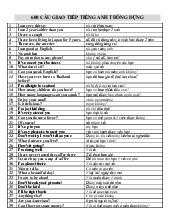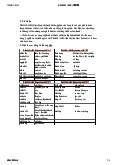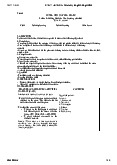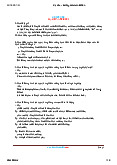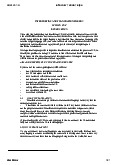





Preview text:
19:23 29/7/24
Unit 1 - Introduction to Media Literacy introduction A. Overview of the Unit
Learning Objectives:
Understandmedialiteracyanditsimportance
Analyze and interpretmediamessagesthroughguidedquestions Preview a text
Learnhowtouseskimming and scanningwhenyouread Read for the main idea
Defineandaccuratelyusecontent-relatedvocabularyincourseactivitiesand games
Read,watch,andlistentoavarietyoftextsandmultimediasources
Demonstrateyourunderstandingofthesetextsandkeycourseideasthrough
comprehensioncheckquizzesandadiscussionboardresponse
B. Course Overview: Introduction to media Literacy Course topics:
Definingmediaandmedialiteracy
Differencesbetweentraditionalandsocialmedia
Advertisementsinthemedia Biasinthemedia Diversityinthemedia
C. Course Overview: Topics, Assessments, Games & Activities
English for Media Literacy by @liztheprincess about:blank 1/6 19:23 29/7/24
Unit 1 - Introduction to Media Literacy media in today's world A. Media is Everywhere
1. What is media?
Thedifferentchannels news,entertainment,marketing ( messagesorother informationisspread)
Inthepast,thewordmedia-plural
Now,stillmeansthemanywaysinwhichinformationisspreadbutactslikea singularnoun
(other example:Data,Agenda)
Oldesttype:printmedia(newspaper, magazinesandbillboards)
Commontypes:radio->television-> internet
2. Where do we see or hear media messages? Everywhere!
3. How often do we see or hear media messages? Constantly!
B. Listening: Interview with William Cowen
1. How much time the average person interacts with media messages a day Depends on:
People'slevelofinterestinmedia
Geographyandaccess(availabilityofmedia)
2. Are there certain types of people that see media messages more often? How about less often? Depends on: Access Jobs Functions Interests
3. What impact does the media have on people's everyday lives
Makethemfeelbeingapartofabiggersystem
English for Media Literacy by @liztheprincess about:blank 2/6 19:23 29/7/24
Unit 1 - Introduction to Media Literacy
4. Positive effects of interacting with media
Theabilitytobeeducated Connecttopeople 5. Negative effect
Thequalityofparticularmediaoutlet
6. How has the media changed overtime
Purposeandcontent:notchanged
Deliverymechanism:quicker,instantaneous
7. Media heading in the future
Increaseintechnology:moreaccess-improveconnectivity
C. Language Focus: Previewing the Text 1. Title
"WhatdoIalreadyknowaboutthistopic?" 2. Picture & captions 1.
Predict:makeaguessaboutthewholeinformation
3. Subheadings: smalltitlethatintroducedifferentsectionsofatext
4. First Paragraph: containthemainidea
English for Media Literacy by @liztheprincess about:blank 3/6 19:23 29/7/24
Unit 1 - Introduction to Media Literacy media literacy
A. What’s Media Literacy 1. Literacy -
Definition: the ability to read, understand, analyse, and create with a writtenlanguage -
Someonewhohasliteracyisaliterate person 2. Media Literacy -
Definition:theabilitytoread, understand, analyse, and createwithmedia -
Withnotonlytextbutalsootherpiecesofthemessagesuchaspicturesordata -
Knowtoaskimportantquestion o Themessage o
Thepeoplewhomadethemessage
B. Basic Reading: Can you Separate Fact from Fiction? 1. What is Media Literacy
MediaLiteracystartswithaskingtherightquestions:Whocreatedthismessage?
Whatwordsorimagesareusedinthismessage,andwhy?Howisthismessage
supposedtomakemefeel?
2. Why is Media Literacy important? - Asktherightquestion -
Understandtheinfluencesofthe -
Lookatdifferentviewpoints messages -
Maketherightconnections - Readtheimages -
Criticalthing&self-expression -
Understand where information
comesfrom,who it benefitsand - Understandmediamessages
howtofindotherviews.
3. How can I become Media Literate
Paycarefulattentiontowhatyouread,watchandhear.
C. Advanced Reading: Can you Separate Fact from Fiction?
D. Part 1+2: How Can we Analyse Media Messages 1.
Who created the message that is being sent?
It is important to think about what choices were made and how it affects or
changesthestorywearetold
2. What techniques were used to attract my attention? -
Using:humour,comedy,image,colour -
Goal:viewercontinuetoread/watchthemediamessages
English for Media Literacy by @liztheprincess about:blank 4/6 19:23 29/7/24
Unit 1 - Introduction to Media Literacy
3. How might other people understand or interpret this message differently from me?
Differencesisbasedon: o Age o Culture o Gender o Beliefs
4. What points of view and values are included or omitted from this message? -
ReligiousorPoliticalBeliefs -
It’simportanttoinclude: o Ideas omit o Opinions tonotinclude o Background
5. Why was this message sent? - Giveinformation - Convincetobuy
=> To gain MONEY or POWER - Entertain
E. Advanced Reading: Debate over Free Press in Ukraine Sufers from Old Stereotypes
F. Language Focus: Skimming and Scanning 1.
Skimming: readingquicklyforthemainidea(theoverallmessageofthetext) - Title - Firstparagraph -
Firstsentencesofotherparagraphs - Lastparagraph
2. Scanning: readingquicklytofindsomespecificinformation - Number - Capitalletter - Subheading - Picture G. Supplemental Reading spin
canbecharacterizedaspresentingan
issueinaperspectivemostfavorable
toagivenpointofview.
English for Media Literacy by @liztheprincess about:blank 5/6 19:23 29/7/24
Unit 1 - Introduction to Media Literacy
English for Media Literacy by @liztheprincess about:blank 6/6
